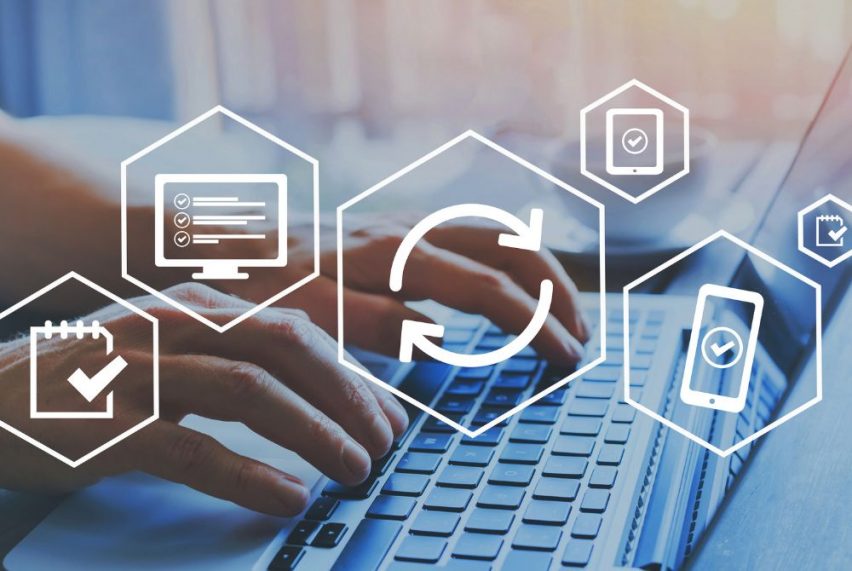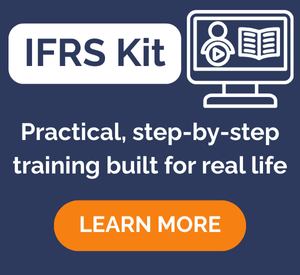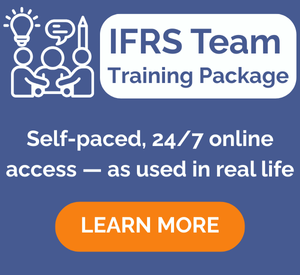Distinct or not distinct under IFRS 15?
Question from my reader:
“I work for a software company. We develop software and sell it to our clients. Clients can buy the installation services from us. Also, we provide 1-year of support services after the purchase.
I am very confused when it comes to determining the performance obligations under IFRS 15. They should be distinct, but what is distinct in this case?”
IFRS Answer: Define “distinct”
Distinct or not distinct – yes, I understand why people get confused about these concepts.
Yet it is absolutely crucial to get it right, because further steps in the revenue recognition process depend on the correct splitting of the contract into separate distinct performance obligations.
What is distinct?
IFRS 15.27 says that a good or a service is distinct if both of the following are met:
- The good or service is capable of being distinct.
It means that the customer can benefit from it either on its own or together with other available resources. - The good or service is distinct within the context of the contract.
It means that the good or a service is separately identifiable from other promises in the contract.
Here, you have two steps, or two levels to assess whether your goods or services are distinct:
- You need to assess the good or service at its individual level.
Is the good or service capable of being distinct?
Basically, in the first step, you are assessing the minimum characteristics for a good or service to be distinct and thus accounted for separately.
- Only if you said yes in the first step, you assess whether this good or a service is distinct in the context of the contract.
Here you are assessing what is interrelationship of the goods and services in the contract.
Just as an example: imagine you agreed to build a house for your customer and within the construction, you deliver everything: walls, roof, electricity installations etc.
Each of these things meets the first criterion – it is capable of being distinct, because the customer can benefit from it on its own or with other available resources.
For example: a roof.
A customer cannot benefit from the roof on its own, but if the house is ready just without the roof, then yes, customer can buy the roof elsewhere and benefit from it.
But, despite these items are capable of being distinct, they are NOT distinct in the context of the contract, because the contractor promised to deliver a combined output – a house.
Now let’s break it down a bit.
#1: Is the good or service capable of being distinct?
As written above, this is met in the case when the customer can benefit from the good or service either on its own, or with readily available resources.
What are these resources?
They can either be sold separately by the entity or by another entity, or the customer has already obtained them from the entity from other transactions or events.
Let’s take a look to the goods or services in the software contact:
An entity sells software, installation services and 1-year support. Are these services capable of being distinct?
Can the customer install the software himself? Does the installation significantly modify software? Can the customer use the software also without 1-year support?
It seems yes. Software seems to be capable of being distinct in this case.
Installation services seem capable of being distinct, too, because the question said that the customer could buy the installation from the software vendor. It implies that it was not obligatory.
And even if it was obligatory, then still the customer can benefit from the installation services with readily available resources – software.
The same applies to 1-year support.
In this case we can conclude that yes, the first criterion is met and the software, installation service and 1-year support are capable of being distinct.
But we are not done yet.
#2: Is the good or service distinct within the context of the contract?
Here we need to assess whether the goods or services are separately identifiable in the contract.
Or, in other words, whether the nature of the promise in the contract is to transfer each of those goods or services individually or a combined item.
IFRS 15 lists a few situations when two or more goods or services are NOT separately identifiable and thus not distinct:
- You provide a significant service of integrating the goods or services with other goods or services in the contract into a bundle and you are in fact delivering combined output.
I have mentioned the example of similar situation – when you build a house. - One or more of the goods or services significantly modifies or customizes the other goods or services in the contract.
As an example, you sell software, but before it is functional and customer can use it, you need to customize it to the customer’s environment.
- The goods or services are highly depended or highly interrelated and the entity or a supplier cannot fulfill the contract by transferring each of them independently.
With regard to today’s question, let’s take a look whether the software, installation and 1-year support are separately identifiable.
The customers can buy the installation elsewhere or install the software themselves and it means that installation is separately identifiable.
It simply does not integrate the software to the combined output and it is not highly interrelated, because also other entities can provide installation.
Even if the installation is obligatory per contract, the outcome would still be the same.
The same applies for 1-year support services. Supplier can still transfer the software and customer can use it without the subsequent services.
You should always look to the substance of the contract.
Therefore, software, installation and 1-year support are each distinct goods or services in this case and you need to account for them separately.
Well, you will have to apply your judgment and make lots of considerations in some cases, I know it’s not always easy.
Any comments or questions? Please let me know below. Thank you!
Tags In
JOIN OUR FREE NEWSLETTER AND GET
report "Top 7 IFRS Mistakes" + free IFRS mini-course
Please check your inbox to confirm your subscription.
10 Comments
Leave a Reply Cancel reply
Recent Comments
- BiG4 on IAS 23 Borrowing Costs Explained (2025) + Free Checklist & Video
- Mpho on How to present leases under IFRS 16 in the statement of cash flows (IAS 7)
- Silvia on IFRS 18 Explained: Full Guide + Free Video Lectures + Checklist
- Bilawal on IAS 16 PPE Explained (2025): Full PPE Guide + Free Compliance Checklist
- Augustine Fabuinkwi on IFRS 18 Explained: Full Guide + Free Video Lectures + Checklist
Categories
- Accounting Policies and Estimates (14)
- Consolidation and Groups (25)
- Current Assets (21)
- Financial Instruments (56)
- Financial Statements (54)
- Foreign Currency (9)
- IFRS Videos (74)
- Insurance (3)
- Most popular (6)
- Non-current Assets (56)
- Other Topics (15)
- Provisions and Other Liabilities (46)
- Revenue Recognition (27)
- Uncategorized (1)





Hello Silvia,
If a construction company’s has one performance obligation to provide control services for a building project; If this company decides to sub divide its services as work packages for each year for internal management purposes, does this negative this being a single performance obligation per IFRS 15
how we can recognize the revenue at a real estate development company?
Here’s the article on “construction contracts” under IFRS 15.
Even if the installation is obligatory per contract, the outcome would still be the same – How you can say this , if it is obligatory it should be one PO under the contract and not two
The contractual requirements to use the entity’s installation services does not change the characteristics of the goods or services themselves, nor does it change the entity’s promises to the customer. Thus they are distinct and separately identifiable even if contractually obligatory.
Thanks
Hi
Suppose you have a standard vehicle service contract that provides you with 3 services over a three-year period. That is you are allowed to bring in your vehicle three times for regular servicing over the three year period. Would the individual services be considered distinct
Hi, Im working for a manufaturing company who do manufacture products for overseas wholesale brands. We do export using different inco-terms i.e FOB, FCA CIF, DDP. Sometimes we provide additional services like customice packing. 1. Can we distinct revenue for EXW and other shipping related services ? . 2. Can we distinct other services ?
Consumer products companies will often provide merchandising services to their customers (distributors and retailers) that are aimed at selling their products to the end customer. For example, a consumer products company may provide its own employees to operate a brand-specific counter within the
retailer’s store without being compensated from retailer and at time engage third party specialist to provide such services. In this respect the prime question arising is how to account for such cost by consumer product companies? Should it be classified under marketing and distribution cost or should it be accounted for under cost of sales being cost to fulfil the contract under IFRS 15?
How do you account for crypto currencies.
Please see here.